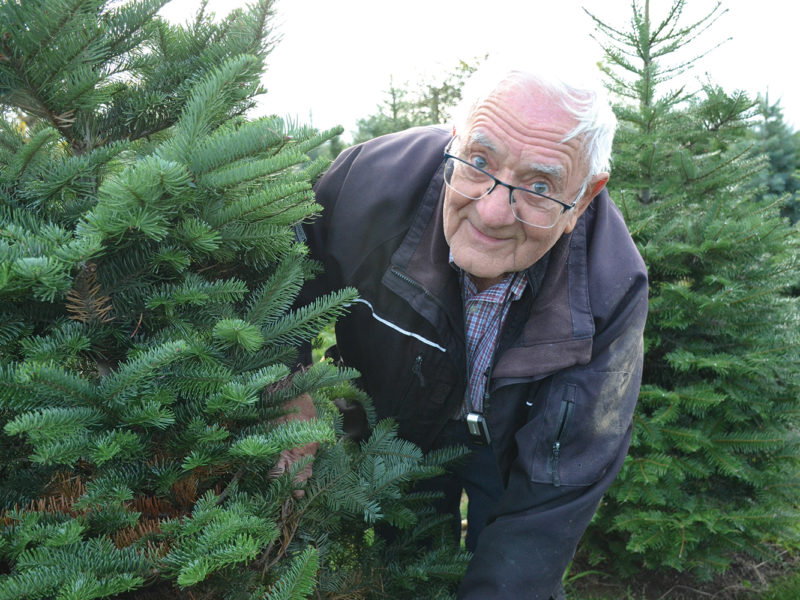CHILLIWACK – BC residents should be able to find their annual Christmas tree this year, but the annual pilgrimage to the tree lot stands to become more challenging.
Art Loewen, founder of Pine Meadows Tree Farms in Chilliwack, is a past president of the Canadian Christmas Trees Association and has been growing trees since 1970. He’s one of nearly 400 Christmas tree growers in the province, down from more than 500 in 2011.
“We’re really hoping we’re going to have enough for anyone who needs a Christmas tree, but we’re cutting back on wholesale to do that,” he says of the lot at his farm. “We are holding back probably 1,000 from wholesale that will be sold here.”
Loewen’s son Tim now runs the family business, which is mostly in nursery trees, while Loewen remains very much involved with the Christmas tree side of things. He stays up to speed on what’s happening in the industry and despite his ingenuity and efforts, says the industry is in decline.
The unprecedented heat wave that rolled across the province this past June is one of a number of factors contributing to the woes.
“We’ll see next spring if they recover,” Loewen says. “Fortunately, we’ve been growing fewer and fewer Fraser firs over the years.”
Up to half the Fraser firs at Loewen’s farm were damaged by the heat, which exceeded 40°C. This compares to just 5% of other varieties, much of which was limited to the tips. Pruning removed minor damage for these varieties, but Loewen expects he’ll end up destroying about 10% of his younger Fraser firs, which suffered most. Many seedlings planted over the past two seasons died, however.
The losses will impact tree availability this year and into the future.
In Enderby, Bud Collis of Christmas Ranch Tree Farm experienced similar issues on his two-acre farm. He expects at least half of his Fraser firs will survive, but he was already low on trees. Strong demand last year cut into his plantings as families showed up to cut their own trees – one of the few allowed outings during the restrictions in place to curb COVID-19 last year.
“I think it was people wanting to get outside with their kids and came to the
u-cut,” he says. “A lot of trees were cut out of there last year.”
It left him short of stock going into this season, so a friend is supplying him with cut trees to supplement his own production. He will have a limited number of u-cut trees available as well as evergreen swags and handcrafted birch items.
“I’ve been selling Fraser fir for 20 years and never had a problem,” he says, blaming the heat for this year’s shortage.
Dry seasons
In Duncan, Robert Russell with Sahtlam Tree Farm says drought has been an increasing issue for both the hard-hit Fraser firs and other varieties.
“For the last four years, I’ve lost seedlings with the droughts that we’ve had,” he says. “So basically, I’ve always planted in the spring. But last year, I planted in the fall and even those trees that went through one of our coastal winters, even they succumbed to the long drought and the situation that occurred in late June.”
He says that Fraser firs about three years old and older were more likely to survive, but younger trees were significantly damaged. On the plus side, higher prices this year will offset the losses. According to Statistics Canada, the farmgate value of BC trees has quadrupled since 2016, and are now worth $13.4 million to growers.
Unfortunately, drought makes for a lower-quality tree.
“The people will be paying more for not quite as good of a product,” he says.
High land prices have made it difficult to attract new entrants as older farmers retire. Russell knows of at least two farms on Vancouver Island that have shut down or are about do so. Russell, now 83, plans to wind down his own wholesale business as a lifestyle choice and will focus exclusively on u-cut in a couple of years.
“The money in a Christmas tree is so low, the next generation isn’t continuing,” says Loewen. “The price of land in BC … is too high to make it worth your while.”
He says even cole crops are more valuable. His son is thinking about inter-planting garlic with young Christmas tree seedlings to increase the return from the land.
Loewen’s pessimism resonates with Russell, who says a combination of more severe weather and basic economics makes it tough for BC growers to continue, even with indigenous species like the Fraser fir.
“It’s going to be harder on the next generation or two to continue in the trees,” he says Russell. “I’m a little pessimistic, I guess, but I can see the future of the Christmas trees declining over the next decade.”


 Catastrophic flooding
Catastrophic flooding